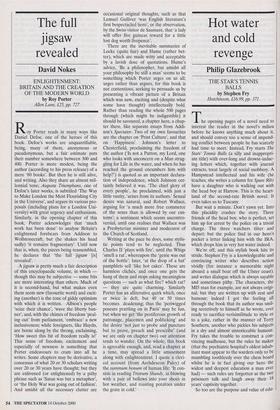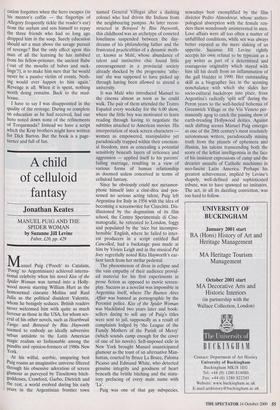Hot water and cold revenge
Philip Glazebrook
THE STAR'S TENNIS BALLS by Stephen Fry Hutchinson, £16.99, pp. 371 The opening pages of a novel need to interest the reader in the novel's milieu before he knows anything much about it, and should convey too a sense of impend- ing conflict between people he has scarcely had time to meet. Instead, Fry starts The Stars' Tennis Balls (a silly and inappropri- ate title) with over-long and drowse-induc- ing letters which, together with journal extracts, treat largely of social snobbery. A Hampstead intellectual and his wife (he teaches, she writes a column for Spare Rib) have a daughter who is walking out with the head boy at Harrow. This is the heart- land of the second-rate British novel. It even takes us to Tuscany.
But wait a minute. Don't yawn yet. Into this placidity crashes the story. Three friends of the head boy, who is perfect, set him up for arrest by the police on a trivial charge. The three watchers titter and depart; but the police find in our hero's pocket a letter linking him with the IRA, which drops him in very hot water indeed.
We're off, and this stylish book hits its stride. Stephen Fry is a knowledgeable and convincing writer who describes action vividly (for instance a memorable night aboard a small boat off the Ulster coast), and writes dialogue which is always sayable and sometimes pithy. The characters, the MI5 man for example, are not always origi- nal, but they are written up with zest and humour; indeed I got the feeling all through the book that its author was smil- ing secretively to himself as he wrote, ever ready to sacrifice verisimilitude to style or to a joke, rather in the manner of Terry Southern, another who pickles his subjects in a dry and almost unnoticeable humour. Fry takes the trouble to construct a con- vincing madhouse, but the rules he makes (that the psychiatric hospital's oldest inhab- itant must appear to the warders only to be mumbling toothlessly over the chess board whilst he is in fact giving our hero the widest and deepest education a man ever had) — such rules are forgotten as the two prisoners talk and laugh away their 18 years' captivity together.
So too are the purpose and value of edu- cation forgotten when the hero escapes (in his mentor's coffin — the fingertips of Allegory frequently tickle the reader's ear) from the asylum and sets himself to repay the three friends who had so long ago dropped him in the soup. Surely education should set a man above the savage pursuit of revenge? But the only effect upon this man of all the learning he has imbibed from his fellow-prisoner, the ancient Babe (`out of the mouths of babes and suck- lings'?), is to make him sure that 'he would never be a passive victim of events. Noth- ing would ever happen to him again.' Revenge is all. When it is spent, nothing worth doing remains. Back to the mad- house.
I have to say I was disappointed in the quality of the revenge. During so complete an education as he had received, had our hero noted down none of the refinements of Torquemada? Instead we have a script which the Kray brothers might have written for Dick Barton. But the book is a page- turner and full of fun.



















































































 Previous page
Previous page